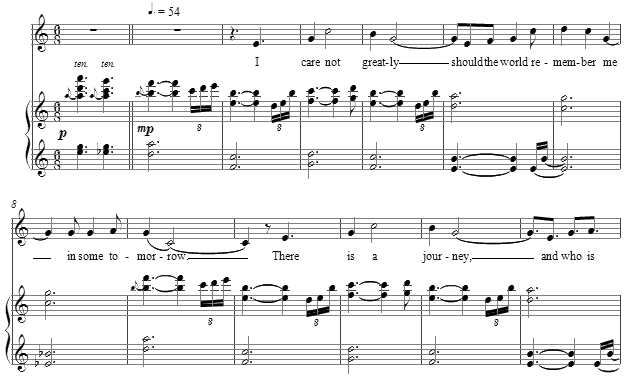Music and Texts of GARY BACHLUND
Vocal Music | Piano | Organ | Chamber Music | Orchestral | Articles and Commentary | Poems and Stories | Miscellany | FAQs
Hokku - (2007)
E. E. Cummingsoriginally for medium voice and piano
I care not greatly
Should the world remember me
In some tomorrow.
There is a journey,
And who is for the long road
Loves not to linger.
For him the night calls,
Out of the dawn and sunset
Who has made poems.[ 1 page, circa 1' 10" ]
E. E. Cummings
Published in the Harvard Monthly, in April of 1916, this three sentence statement seems quite the credo for Cummings' later work. There is is the act of creating a pressure and urging on which is not content to revel in what was just done. Stravinsky suggests much the same in his response to the question as to which was his favorite work. The correct answer is "the one I am working on now." That is the journey and the creative soul "loves not to linger."
Hokku seems the older spelling for haiku, a genre of poetry which was given its current name by the Japanese writer Masaoka Shiki at the end of the 19th century according to the WIKI article I consulted. Other scholars offer other explanations according to their research, but as I choose these words to be used as a single song lyric, such scholarship is of little consequence to its function as a single text for singing, be it one poem or three published together by the Harvard Monthly.
The traditional 3 line form of alternating 5- 7- 5 syllable lengths is not quite exact for the last strophe when translated into music, but the use of three of these singular forms in one poem is also a variant. The form, however, is of less consequence than the message therein. While some would count the word, "poem," as meeting the criteria, for being two syllables, in setting to music the text it becomes more akin to those diphthongs (as in Italian and German) in which one vocalization is completed with the second vowel only quickly touched upon. For the scholar of haiku forms and syllabification in spoken language who is not a singer nor polyglot, this will not be apparent, while to the worldly singer is a normal practice. But then again, to quote Cummings from another moment of wisdom, "You and I are human beings;most people are snobs."
For medium voice, this gentle setting of the three statements lie symmetrically across a seven-measure period in the accompaniment, with the last period extended into a final cadence, D-flat in the accompaniment forcing the D in the vocal line to move, suggesting that the creative process "loves not to linger."
The score for Hokku in the medium key is available as a free PDF download, though any major commercial performance or recording of the work is prohibited without prior arrangement with the composer. Click on the graphic below for this piano-vocal score.

